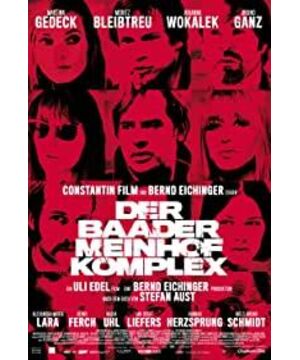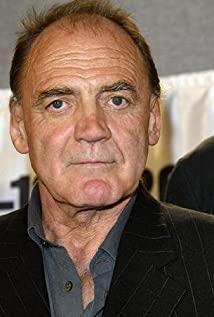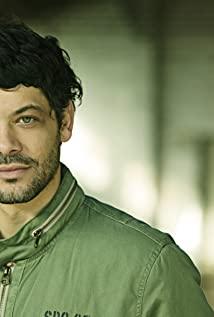The "Red Army Front RAF" concept of urban guerrilla warfare
is not based on an optimistic view that can reverse the current political atmosphere of the Federal Republic and West Berlin." The Red Army Faction's Urban Guerilla Concept is not based on an optimistic view of the prevailing at The Federal Republic and in CIRCUMSTANCES West Berlin
-The urban guerrilla concept authored by RAF CO-founder Ulrike Meinhof (April 1971)
(乌莱克迈因霍husband, red front RAF founders, "the concept of urban guerrilla warfare" author. April 1971 .)
If you don’t know the background of the movie "Badermainhof", the audience is likely to regard this movie as a second-rate crime film. The terms
Red Army Front RAF or leftist radicals are young in most of China. People may think of the Long March of the Communist Party of China or the Cultural Revolution. The fact is that this is the term for organizations and members of the "revolutionary movement" that occurred in Germany and even the entire Western world in the late 1960s and early 1970s.
"Red Army Front" The appearance of RAF in West Germany is not accidental and individual, such as the Italian Red Brigade, the German Red Army faction, the French Direct Action, the American weather forecaster, the Japanese Red Army, etc.
And why these organizations appeared in the late 1960s, 70 The era was at its peak, and it finally
disappeared in the early 1990s. There are historical reasons for thought-provoking and reflection. The movie "Badelmainhof" took place in West Germany. I will only briefly analyze the movie "Red Army Front RAF". "The historical reasons for the formation. If you want to carefully review the political organizations and radical movements throughout the 1960s, I will write about it for a few years.
Since the Second World War, the entire world has split into two major groups, the "free world" and the "communist camp". The United States and the Soviet Union have set off a struggle for political, military, and ideological values around the world, respectively, led by the United States and the Soviet Union. Although there is no gunpowder of the world war, the white-hot and fierce struggle is no less than any real-life rain of bullets. Today we call that period the "Cold War." It was not until the collapse of the Berlin Wall in 1990 and the disintegration of the Soviet Union in 1991 that the "Cold War" quietly came to an end.
After the end of World War II, Germany was divided and ruled by the US and the Soviet Union. With the Berlin Wall as the boundary, west of the wall is the Western "free world" West Germany headed by the United States, and to the east of the wall is the "socialist" East Germany led by the Soviet forces. .
The historical reasons why the "Red Army Front" appeared in West Germany in the late 1960s are as follows:
1. In order to consolidate its own interests, the Western capitalist world, headed by the United States, did not hesitate to cooperate with the Nazis politically and frantically suppress the leftist and communist movements. West Germany abolished the legitimacy of the Communist Party in 1956. At the same time, among the members of the West German government, not only most government officials are members of right-wing organizations or political parties, but even many former Nazis also served as key members of the West German government. . (Konrad Adenauer, the first Federal Chancellor of West Germany, actually retained the post of former Nazi Prime Minister's Secretary Hans Globke), and at the local level, Nazi forces were protected by the West German government and flooded into government agencies like stitches. These measures to a large extent make the political opinions and demands of left-wing youths lack a legal organization platform. Although many new left-wing parties were established at this time, their nature and goals have been distinguished from those of the original German Communist Party. The minds of students and intellectuals are very different from the ideals they are pursuing.
In addition, as the mouthpieces of ideas and news, radio and newspapers are controlled by big capitalists with strong conservatism, and they constantly control and attack the thoughts and movements of left-wing youths. By the end of the 1960s, the West German political arena was basically occupied by the "Grand United" coalition of the Social Democratic Party (SPD) and the Christian Democratic Union (CDU) (occupying 95% of the seats in the Bundestag), and the former Nazi member Kurt Georg Kiesinger became Federal Chancellor of West Germany. The political arena in West Germany is completely shrouded in an atmosphere of "Pro-Nato" and "pro-Capitalist." Intellectuals and young students use "political convenience" methods against the Social Democrats, and the ugly act of coexisting with the right-wing forces is not only annoying but also unpleasant. fear. It can be said that American McCarthyism is at its peak in West Germany than in the United States. The United States basically no longer had formal McCarthyism activities in the early 1960s, while in West Germany, this influence lasted longer. (In 1972, West Germany even passed a law, the Berufsverbot Act, prohibiting radicals or people with "suspicious tendencies" from serving in government departments) Where
there is oppression, there is resistance! How deep is the oppression, how high is the resistance! In my opinion, this is one of the main reasons why the left-wing radical movement surged in West Germany in the following decades.
2. The national independence movement and communist revolutionary movement are surging around the world, and the struggle against imperialism led by the United States has become increasingly fierce and fierce. The Cuban Revolution, Castro and Che Guevara’s South American socialist revolutionary struggles were widely spread in the West, especially among West German intellectuals and young students. Che Guevara became synonymous with guerrilla fighters, a violent revolution marked by his portrait. The image is popular among all left-wing youths.
The anti-French independence revolutionary movement in Algeria, which is closely related to Europe, is also in full swing. Similarly, the way of guerrilla warfare has attracted strong attention from the European people, and finally got rid of French colonization and became an independent socialist country, which has aroused great repercussions in Europe and even the world.
The desire to resist the shackles, inequality, and the capitalist social system has become a reality in the real world, and the reality of progress can be seen every day. To a large extent, this encouraged the suppressed left-wing youths of West Germany, allowing them to see the possibility and hope in their own desperate environment.
3. Western intellectuals and young students dominated the women’s liberation movement, the anarchy movement, the American civil rights movement, and the influence of the anti-racism movement in Europe and the United States. The emergence of these ideologies is closely related to the cultural and artistic activities of the time. Because of the popularization of television, regions are no longer the main obstacles to the exchange of ideas and arts. While the American soldiers are stationed in Western Europe, they have also brought in a large number of them through popular culture. Non-mainstream political consciousness. The anti-war movements in Europe and the United States arising from the Vietnam War, including the hippie movement in the cultural field, promoted the anti-social and anti-capitalist craze among Western youth. The Beatles’ popular songs with a strong sense of rebellion became a subconscious catalyst of the revolution and played a role in fanning the radical youth organizations in the West. (The American left-wing radical organization Weatherman found the name and meaning of their organization from the songs of American pop singer Bob Dylan in the 1960s.)
4. The Soviet Union's invasion of Hungary and the internal division of communism, and the emergence of anti-Stalinism have accelerated the needs of left-wing youths in the West to seek a new political line and way of struggle.
All the aforementioned historical conditions are the reasons why the Red Army front was finally formed around 1969. They are not simple violent elements. For example, one of the founders, Meinhof, is himself a successful journalist, columnist and "intellectual with unique ideas in his field of expertise" (Wikipedia). The heroine in the movie, Gudrun Ensslin, said in a speech about the demonstrators being shot and killed by the police during the anti-Iranian queen parade conflict: They (referring to the government and the police) will kill us all. You have to know that we are rebelling What kind of pig? They are a type of Auschwitz (the Holocaust). How can you reason with the people who caused the Holocaust? They are armed to the teeth and we are unarmed, we must be armed.
Rudi Dutschke, who was assassinated in the movie, was also a well-known intellectual. Before he was assassinated, Bild-Zeitung, the mainstream anti-communist and anti-student movement newspaper, once published an article on the front page with the title: "Stop Dutschke now!" (A metaphor: kill him now), and because of his assassination, Meinhof, the founder of the Red Army front declared: Burning a car is a crime, and burning a hundred cars is a political action!
The movie "Badder Meinhoff" moved me as much as the recent movie "Wrestling King". What moved me was just like the words of Mainhoff quoted at the beginning of this article, and just like Steve McQueen's Cincinnati kid, also Just like the song sung by the great American singer Bob Seger in the 1960s, against the wind!
Against the wind
It seems like yesterday
But it was long ago
Janey was lovely, she was the queen of my nights
There in the darkness with the radio playlng low
And the secrets that we shared
The mountains that we moved
Caught like a wildfire out of control
Till there was nothing left to burn and nothing left to prove
And I remember what she said to me
How she swore that it never would end
I remember how she held me oh so tight
Wish I didnt know now what I didnt know then
Against the wind
We were runnin against the wind
We were young and strong, we were runnin
Against the wind
And the years rolled slowly past
And I found myself alone
Surrounded bv stranners I thought were my friends
I found myself further and further from my home
And I guess I lost my way
There were oh so many roads
I was living to run and running to live
Never worried about paying or even how much I owed
Moving eight miles a minute for months at a time
Breaking all of the rules that would bend
I began to find myself searchin
Searching for shelter again and again
Against the wind
A little something against the wind
I found myself seeking shelter against the wind
Well Those Drifters Days are Past Me now
Ive GOT SO much More to of Think the About
Deadlines and Commitments
the What to the Leave in, the What to the Leave OUT
Against at The Wind
Im Still runnin Against at The Wind
Well Im older now and Still
Against at The Wind
Without that This kind of consciousness that goes up against the wind, you have become an object in the frame.
People's Daily Online reported that on January 14, the Greek police claimed that the Greek left-wing terrorist organization Revolutionary Struggle claimed responsibility for the two recent attacks on explosion-proof police in Athens. This is the latest development of a left-wing terrorist organization in Europe that has been silent for many years.
This news reminded me of the Red Army Front’s quotation of proletarian leader Rosa Luxemburg’s closing words when it was officially disbanded in 1998: “The revolution said: I was, I exist, and I still do.”
View more about The Baader Meinhof Complex reviews










